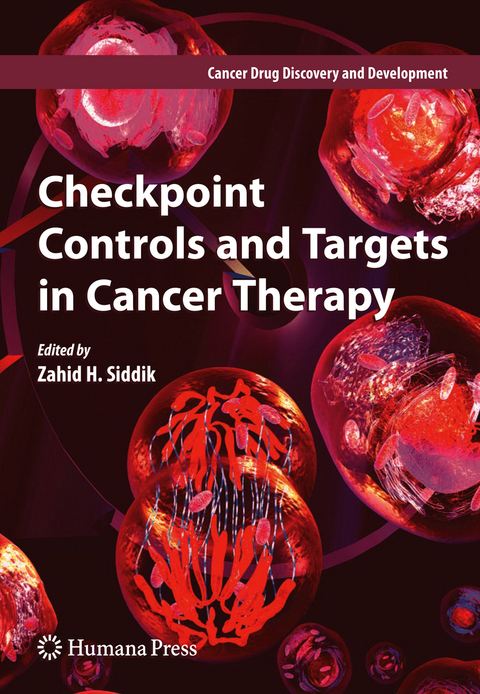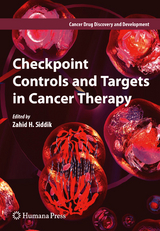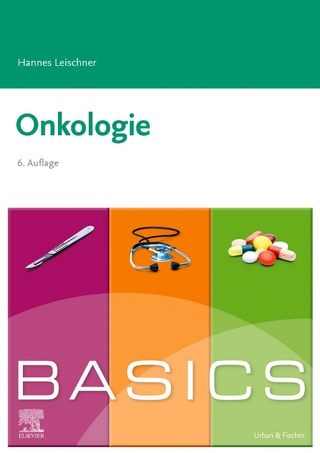Checkpoint Controls and Targets in Cancer Therapy
Humana Press Inc. (Verlag)
978-1-60761-177-6 (ISBN)
It is intriguing that checkpoint pathways are also critical in cancer therapy to provide an apoptotic stimulus when cellular damage induced by the therapeutic agent is detected by the sensor system. Therefore, it is not surprising that failure in pro-survival checkpoint response will render tumor cells hypersensitive to cytotoxics and, conversely, failure in pro-apoptotic checkpoint response will induce genetic instability and/or therapeutic resistance. Understanding the intricacies of checkpoint response is, therefore, central to the design of therapeutic regimen that will enhance antitumor effects. Although early versions of this design entail combination of cytotoxic agents with cell cycle or checkpoint inhibitors, a greater understanding of the concepts could make such combinations clinically more effective. The contributions in this book will consolidate the current state of knowledge on checkpoint responses that may lay the foundation for hypothesis-driven rational approaches in advancing the management of cancer.
The immediate attraction of the book to the scientific community is that it represents a timely opportunity to build upon existing concepts of checkpoints to expand our understanding of the inner workings of the critical checkpoint machinery. The present understanding has provided ample appreciation that response to checkpoint activation is manifested through coordinated inhibition of cyclin-dependent kinase (CDK) complexes in G1, S and/or the G2 phase in order to arrest the cell cycle. Kinase inhibition can occur through several mechanisms, including inhibitory phosphorylation of CDK, destruction of the cognate cyclins, and recruitment of CDK inhibitors from the INK and WAF1/CIP1 families. However, the wealth of information from recent discoveries needs to be examined critically to consolidate our conceptual knowledge of checkpoints. At the same time, there is acute awareness in the diversity of checkpoint response between cytotoxic agents, and this serves as a reminder of the magnitude of complexity that is inherent in checkpoint regulation. This volume is intended to bring the cancer research community closer toward an improved understanding of this regulation, how checkpoint abnormalities can impact negatively on cancer therapy, and emerging strategies to target checkpoint response as a therapeutic end-point.
Circuitry of Checkpoint Response.- Evasion of G1 Checkpoints in Cancer.- Distinct Pathways Involved in S-Phase Checkpoint Control.- Mechanisms of G2 Phase Arrest in DNA Damage-Induced Checkpoint Response.- Centrosomes in Checkpoint Responses.- Interplay of 14-3-3 Family of Proteins with DNA Damage-Regulated Molecules in Checkpoint Control.- Checkpoint Response and the Aetiology of Cancer.- Chromatin Modifications and Orchestration of Checkpoint Response in Cancer.- DNA Damage Response and the Balance Between Cell Survival and Cell Death.- Dysfunction of the RB Retinoblastoma Gene in Cancer.- G1 Phase Cyclins in Cancer Development and Progression.- The BRCA1/2 Pathway Prevents Some Leukemias and Lymphomas in Addition to Breast/Ovarian Cancers: Malignancies that Overcome Checkpoint Controls.- Targeting Checkpoint Response in Cancer Therapy.- Regulation of p53 Activity and Associated Checkpoint Controls.- The Importance of p53 Signaling in the Response of Cells to Checkpoint Inhibitors.- Targeting p21-Dependent Pathways for Cell Death in Cancer Therapy.- p27Kip1 as a Biomarker and Target for Treatment of Cancer.- Targeting Cyclin-Dependent Kinases with Small Molecule Inhibitors.- Chk1 and Chk2 as Checkpoint Targets.- Targeting Cdc25 Phosphatases in Cancer Therapy.
From the reviews:
“This nicely organized book focuses on cell cycle checkpoint and cancer biology/therapeutics. … The book is written for graduate students, residents, and postdoctoral investigators in basic, translational, or clinical cancer research. The contributing authors are active investigators at the forefront of this field. … This book presents timely, comprehensive reviews of the rapidly progressing field of checkpoint. It should be quite useful for readers who are seeking a solid grasp of updated information in this field.” (Hiroaki Kiyokawa, Doody’s Review Service, March, 2010)
| Erscheint lt. Verlag | 7.9.2009 |
|---|---|
| Reihe/Serie | Cancer Drug Discovery and Development |
| Zusatzinfo | 13 Illustrations, color; 30 Illustrations, black and white; XIV, 274 p. 43 illus., 13 illus. in color. |
| Verlagsort | Totowa, NJ |
| Sprache | englisch |
| Maße | 178 x 254 mm |
| Themenwelt | Medizin / Pharmazie ► Medizinische Fachgebiete ► Onkologie |
| Medizin / Pharmazie ► Medizinische Fachgebiete ► Pharmakologie / Pharmakotherapie | |
| Medizin / Pharmazie ► Studium | |
| ISBN-10 | 1-60761-177-5 / 1607611775 |
| ISBN-13 | 978-1-60761-177-6 / 9781607611776 |
| Zustand | Neuware |
| Haben Sie eine Frage zum Produkt? |
aus dem Bereich




